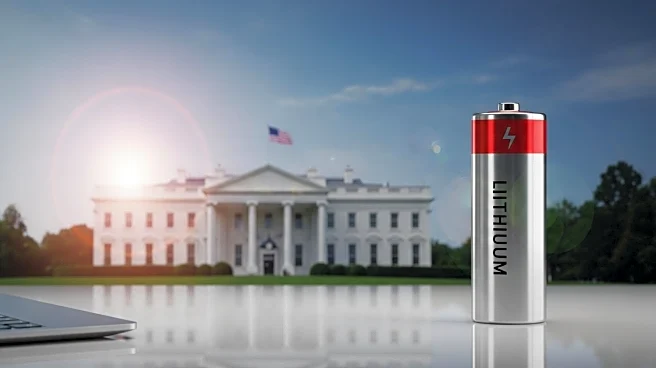What is the story about?
What's Happening?
Lithium Americas (LAC) stock surged significantly following reports that the Trump administration is considering acquiring up to a 10% equity stake in the company. This move is part of renegotiating terms for a $2.26 billion Department of Energy loan related to the Thacker Pass lithium mine in Nevada. The mine, expected to be the largest lithium source in the Western Hemisphere upon its 2028 opening, is a joint venture with General Motors, which holds a 38% stake. The renegotiation was prompted by Lithium Americas and GM's failure to meet conditions for the first loan disbursement, leading the company to request a delay in loan repayment due to depressed lithium prices caused by Chinese overproduction.
Why It's Important?
The Trump administration's interest in acquiring a stake in Lithium Americas highlights the strategic importance of securing domestic lithium supply chains, crucial for national security and the electric vehicle industry. The Thacker Pass mine's projected output could significantly reduce U.S. dependence on Chinese lithium processing, which currently dominates over 75% of global refining capacity. This government investment approach, similar to previous stakes in Intel and MP Materials, signals a hands-on strategy to bolster critical mineral supply chains. The market's positive response, including a rise in GM stock, reflects optimism about strengthening domestic EV battery supply chains.
What's Next?
The renegotiation of the loan terms and potential equity acquisition by the Trump administration could lead to further strategic investments in domestic lithium production. Stakeholders, including General Motors and other industry players, may adjust their strategies to align with the government's focus on reducing reliance on foreign lithium processing. The development of the Thacker Pass mine will be closely watched as it progresses towards its 2028 opening, potentially reshaping the U.S. lithium market landscape.
Beyond the Headlines
The Trump administration's approach to securing critical mineral supply chains may influence future government policies and investments in other strategic industries. This could lead to broader implications for U.S. energy independence and technological advancements in the electric vehicle sector. The focus on domestic production may also prompt discussions on environmental and regulatory considerations associated with large-scale mining projects.
















